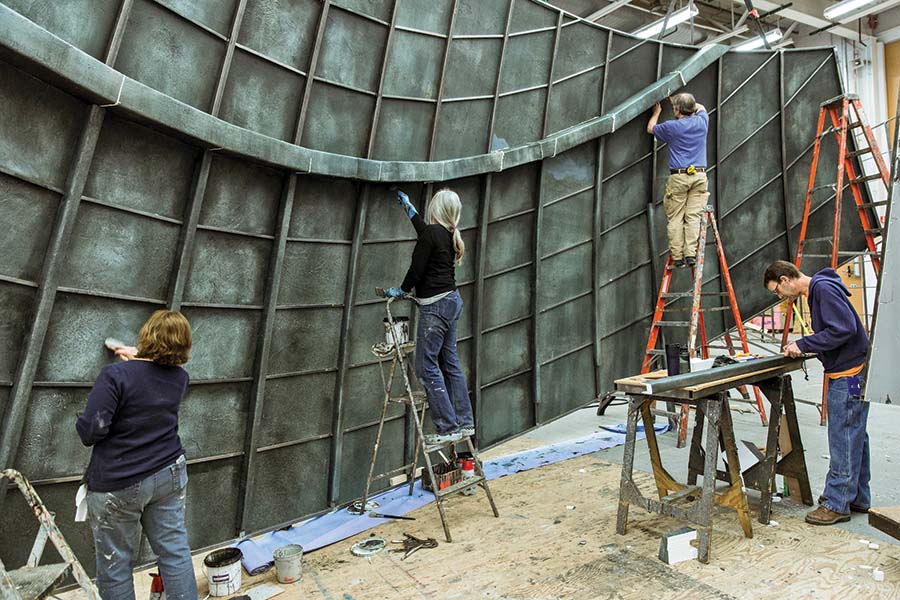“Hell week” doesn’t actually have to be hell. Sure, it can mean long hours in the theatre, with first tech runs that can make even the most confident practitioners question if it will all come together. But it still doesn’t need to be awful. What’s the key to a more humane tech? It can be as simple as remembering that everyone involved is human.
Some theatres adjust tech schedules to try to ensure that everyone has some time off to rest and recuperate. At American Players Theatre, that translates to production manager Michael Broh not asking shop heads to be at previews for shows, knowing he’ll be able to effectively pass on notes. Some shops also stagger work time, so that even though the prop shop, for instance, is still operating seven days per week, each member of the shop is able to get a day off, knowing the productions still have someone around to help if needed.
“The thing I want to see in the world is the production staff treated like reasonable people who want to live reasonable lives,” Broh said. “Tech always pushes that envelope, and that’s as expected and okay, but we can’t let that become the norm. Finding ways to make theatre compatible with quality of life is just so important.”
The schedule changes made at East West Players are a bit more drastic. Snehal Desai, EWP’s artistic director, said that he found the company’s tendency to compress tech into two or three days led to diminishing returns. Increasing the number of tech days and reducing the hours per day, he said, has been effective in combating some of the exhaustion and occasional intense emotions that arise.
The tech process isn’t one-size-fits-all, Desai pointed out. Rather than trying to fit one tech structure to both a large-scale musical and a 90-minute play, EWP takes time during their season planning process to begin the conversation about the tech needs of each show. From there they adjust the tech time accordingly. These adjustments also allow some shows to gradually introduce tech elements. Layering in lights one day, sound another, and costumes another, for instance, allows for more one-on-one interaction between the director and designers during the tech process, Desai explained.
While certain elements of tech are universal, what can vary wildly is “the vibe of the room,” Desai said. “A strong, positive vibe—you don’t mind being at tech over a long period of time. But a harsh environment, you just want it to be over with as soon as possible.”
Along those lines, sound designer Elisheba Ittoop said that a simple conversation at the beginning of tech for the Guthrie Theater’s West Side Story led to a significant shift. Ittoop recalled how Joseph Haj, the theatre’s artistic director as well as the director of the show, gathered everyone in the cast and crew together. It was the first time she’d had a director ask everyone to stop programming to join the group. While Haj, along with associate producer Lauren Keating, used the time to emphasize the Guthrie’s anti-harassment policy, Ittoop said, Haj also took the time to have everyone look around and see the other people involved.
“It was this moment of, ‘We are a family and you do not treat family disrespectfully,’” said Ittoop. She felt that the tech for the show ran more smoothly than in other experiences in which she jobbed in without even being introduced to the performers. “Whenever there are these moments when I am humanized and I’m not just your sound designer,” Ittoop said, “we all benefit.”
At Merrimack Repertory Theatre, humanizing means acknowledging that people have kids and welcoming them to all parts of tech. The theatre actually has Pack ’n Play and Rock ’n Play sleepers available for young children to catch some Zs while their parents work. Artistic director Sean Daniels tries to keep the mood light at MRT.
“Even though the stakes are high,” Daniels said, “we’re not rushing organs across a border, so we can all relax a little.”
MRT even tries to make things a bit festive, employing a group of volunteers, “The Friends of MRT,” to provide a group breakfast before the first day of tech. Each “friend” brings a dish for the potluck, and MRT handles some of the logistics. It not only creates a sense of community among the entire company, but as Daniels pointed out, everyone’s a bit calmer when fed.
Tech is a difficult time in any theatre, and many of its scheduling and workload demands are necessary evils. But a little fellow feeling for the shared lift can go a long way. As Haj put it, “We can be very demanding of one another, set the bar very high, have very real expectations of excellence, and not behave like assholes. It’s blisteringly hard as it is. So if you’re not enjoying one another and celebrating one another’s work and artistry and enjoying one another as human beings, then I think you’re probably doing it wrong.”


